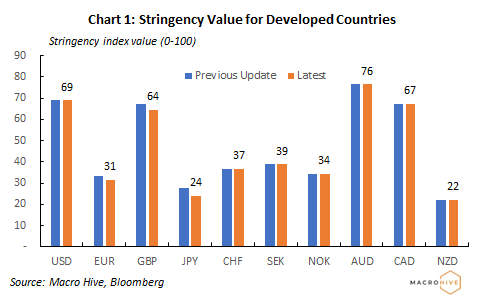

This article is only available to Macro Hive subscribers. Sign-up to receive world-class macro analysis with a daily curated newsletter, podcast, original content from award-winning researchers, cross market strategy, equity insights, trade ideas, crypto flow frameworks, academic paper summaries, explanation and analysis of market-moving events, community investor chat room, and more.
The EU, UK and JPY have seen a fall in stringency values since our last report (Chart 1). The index values, a measure of government action, have now fallen below the EU and Japanese averages for the pandemic. Restrictions in the EU and UK have gradually eased in recent weeks (Chart 3).
The stringency scores for other developed countries have remained unchanged. The US and Australia exhibit the highest indices, reflecting efforts to curb rises in infections. Switzerland, Norway and New Zealand have stringency values below their pandemic average.
Across the developing world, Poland, Turkey and Russia have seen significant decreases in stringency scores (Chart 2). Their values are now at similar levels to early- March. Cases in these countries are following a steady decline, but scores could also reflect degrees of lockdown and economic support.
India is the only developing country on our list to have seen a rise in its stringency index. The country recorded a record number of new cases last week, and there are signs that the level of infections are not yet slowing. For more information, follow our daily COVID Tracker.
Bilal Hafeez is the CEO and Editor of Macro Hive. He spent over twenty years doing research at big banks – JPMorgan, Deutsche Bank, and Nomura, where he had various “Global Head” roles and did FX, rates and cross-markets research.

(The commentary contained in the above article does not constitute an offer or a solicitation, or a recommendation to implement or liquidate an investment or to carry out any other transaction. It should not be used as a basis for any investment decision or other decision. Any investment decision should be based on appropriate professional advice specific to your needs.)